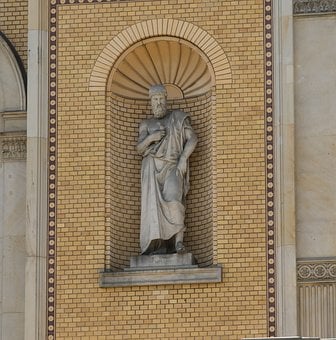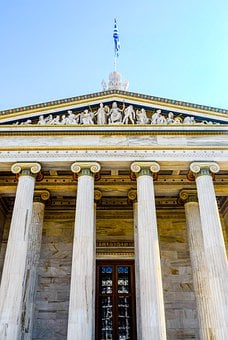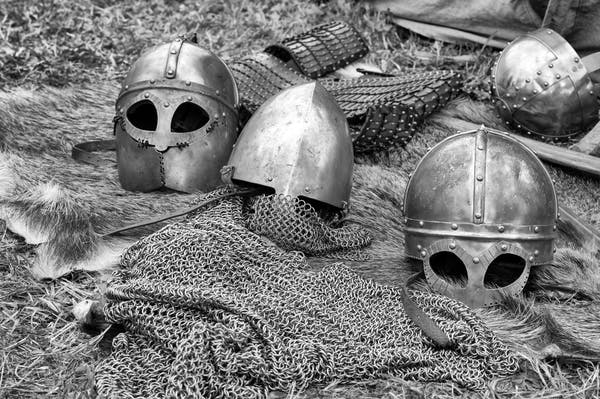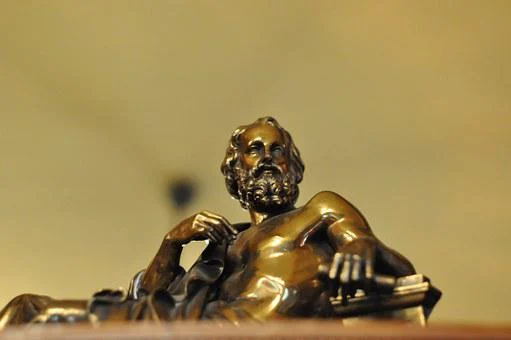The philosopher Plato was born in Athens, Greece in 428 or 427 BCE and died in 348 or 347. He was Socrates’ student and a great Greek philosopher in his own right. He was also Aristotle’s teacher and founded the Academy. Most philosophy students know him as the writer of several influential philosophical works.
These works were mostly an exploration of equality, justice, and the concept of beauty. He would also discuss aesthetics, theology, epistemology, political philosophy, cosmology, and even the philosophy of language. The Academy of Athens, from where we get the English word ‘academic’ was founded by Plato and is recorded in history as being among the pioneering institutes offering higher learning within the Western world.
Early Life of Plato
The time period of Plato’s birth and his early childhood doesn’t give us a lot of informative sources. However, most of what we know about Plato and his early life has been painstakingly cobbled together by scholars who have gone through his works and compared them to the writings of his contemporaries. The works of classical historians were also taken into account.
According to mainstream historical records, Plato was born around the year 428 BCE. However, the later scholars have managed to make some connections with later happenings in the philosopher’s life. According to them, Plato’s birth date was more likely to be around 424 or 423 BCE.
Regardless of the exact year of his birth, we still know that Plato was born to a Greek aristocrat couple. His father, named Ariston, was the descendant of the kings of Messenia and Athens. His mother, named Pericitone, was a relative of Solon, a well-known Greek statesman in the 6th century BCE.
Some research indicates that the parents named Plato after his grandfather, whose name was Aristocles. However, this is an assumption based on the ancient Greek tradition of giving the firstborn son the name of his grandfather. There’s no concrete evidence that Plato was his parents’ first son, or that he was even given that particular name. Some historians also claim that the name ‘Plato’ was just a nickname that referred to the philosopher’s broad body structure. While this might be a possibility, there are also some historical records that show how ‘Plato’ was an actual boy’s name instead of a pet name or nickname. In fact, there are records of boys with this name before the birth of Plato the philosopher.
Since Plato was part of a high social class, he would have been under the tutelage of the finest educators in Athens. He would probably have studied subjects that included the doctrines of Parmenides, Pythagoras, and Cratylus. The purpose of these was to set a strong foundation for studying metaphysics and epistemology. In simpler words, these mean the study of nature and of knowledge respectively.
Plato lost his father at a young age, after which Pericitone married her own uncle–known as Pyrilampes the Politician. In addition to being a Greek politician, Pyrilampes also held the position of ambassador to Persia. Records show that Plato probably had two brothers and a sister along with a half-brother. However, it’s not quite clear where he came in the order of birth. A lot of his dialogues included members of his own family, indicating a sense of pride in having a noble family lineage.
Major Life-Altering Events in Plato’s Life
While he was still relatively young, Plato went through at least two significant events that somewhat changed his life. If these two events had not taken place, we may not know the name of this philosopher as well as we do now.
The first such event was Plato getting to meet Socrates, who was a famed Greek philosopher even at that time. The younger man greatly admired the debating and dialogue methods that Socrates presented. Eventually, Plato was so impressed that he formed a close association with Socrates. He also determined to spend the rest of his life trying to understand the concept of virtue and how one may form a noble character.
The second important event in Plato’s life was the war fought among Sparta and Athens. This was known as the Peloponnesian War; it lasted from 431 to 404 BCE, which means it stretched for around 27 years. Plato himself also served in this war for around 5 years, from 409 to 404 BCE. The final result of this was that Athens was defeated and its democracy put to an end. The Spartans were the eventual victors; they replaced the precious Athenian democracy with an oligarchic system. In this new form of government, there were two prominent names–Critias and Charmides. Both of them were relatives of Plato, and also noted in history as two of the infamous Thirty Tyrants. These tyrants had a brief ruling span, in which they drastically eliminated most of the precious rights enjoyed by the Athenian citizens. Eventually, this oligarchy also fell and the democratic system was established again. During his time, Plato was inclined towards politics as a career. However, he saw Socrates being executed in 399 BCE, after which he was repulsed by the idea of a political career. Incidents like these spurred him on to a life of pursuing philosophy and other forms of study.
The Travels of Plato
After the death of Socrates, Plato toured the Mediterranean region for around 12 years. He studied mathematics in Italy along with the Pythagoreans. In Egypt, he studied astronomy, geology, geometry, and religion. It was around this time that he started writing somewhat extensively. Some scholars have debated the exact order of such writings, though the most accepted belief is that these works have three separate periods. Let’s have a look at these now.
First, Middle, and Later Periods of Plato’s Works
The early or first period of Plato’s works occurred during the course of his travels. The dates for this span are around 399 to 387 BCE. For instance, ‘The Apology of Socrates’ was probably written a short time after the passing away of Socrates. The other written texts during this time include names like Hippias Major, Hippias Minor, Ion, Euthyphro, and Protagoras. These dialogues include attempts by Plato to convey the teachings and philosophy of Socrates to the readers.
The middle or second period of Plato’s writing has the philosopher writing with his own opinion and voice on certain ideals. The subjects here included concepts such as courage, justice, wisdom, moderation of society and individual, etc. This was also the time when ‘The Republic’ was written—a text that is often studied by students of philosophy even today. Here, Plato explored the meaning of a just government with philosopher kings.
The later or third period saw Socrates in a more minor role than before. Instead, Plato starts taking a more detailed look into the metaphysical ideas from his early stages. He explored how the role of art functioned in society–here, art included music, dance, architecture, drama, morality, and ethics. In the ‘Theory of Forms’, it is suggested that the only constant is the world of ideas. Plato also suggests that the world we perceive through the senses is only deceptive and subject to chance.
The Founding of the Academy
In the year 385 BCE or thereabouts, Plato founded the Academy, which was a school of learning. He presided over this school or the rest of his life. The location of the Academy was probably a sort of enclosed park, and it stayed in operation until 529 CE. At this point, the Roman Emperor Justinian I grew suspicious of it being a hub of paganism and hence an enemy of Christianity. He then closed down the Academy.
While it was still open, the Academy had a curriculum including biology, political theory, astronomy, mathematics, and, of course, philosophy. Plato wanted this school to be a place where future leaders will study and learn how to make a better government for the Greek city-states.
In 367 BCE, Dion, a disciple and friend of Plato, invited the philosopher to be a personal tutor for his nephew. The nephew’s name was Dionysius II and he was the last ruler of Sicily or Syracuse. Dion was also of the belief that his nephew would make an ideal ruler. He hoped that the experience of having Plato as a tutor will prepare Dionysius for the role of a philosopher king. Unfortunately, Dionysius didn’t respond as expected; in fact, he started suspecting both Dion and Plato of having a conspiracy against him. As a result, he sentenced Plato to house arrest and exile Dion. After some time, Plato was able to return to Athens and resume his work in the Academy. His student, Aristotle, was among the more promising youngsters there. Eventually, as we know, Aristotle would be the one to take Plato’s teachings forward.
Last Years and Death
The last years of Plato were dedicated to the Academy as well as his writings. Records are fairly sure that his death in Athens around the year 348 BCE. While the exact situation leading to his death is not known, he was evidently in his early 80s at the time. Some records state that he died while sleeping, while others say that he passed away while at a wedding.
Conclusion and Legacy
The impact of Plato on philosophy is evident to this day. It’s impacted the way we see human nature beyond the borders of Greece. His works have covered several ideas, interests, and concepts such as morals, mathematics, political theory, etc. Some of his works have even established the way we understand the universe today, in addition to laying the foundation for modern democracy.
The philosophy of Confucius has also contributed a lot to the modern world, so we should read up on him as well.






